Let others know what you truly want and need when you find your authentic voice!
By Kate Hesse
Let’s start with a peek behind the scenes.
The first several guided meditations and visualizations I recorded, I was trying so hard to sound like I thought a meditation “should” sound like. Which resulted in those recordings sounding weird and really inauthentic. Even my mom couldn’t listen to them!
But fixing those recordings wasn’t simply about sitting in front of the microphone and trying again, first I needed to discover how to speak them in a way that felt authentic to me. Which is why I’m so excited to answer this week’s question.
What is your authentic voice?
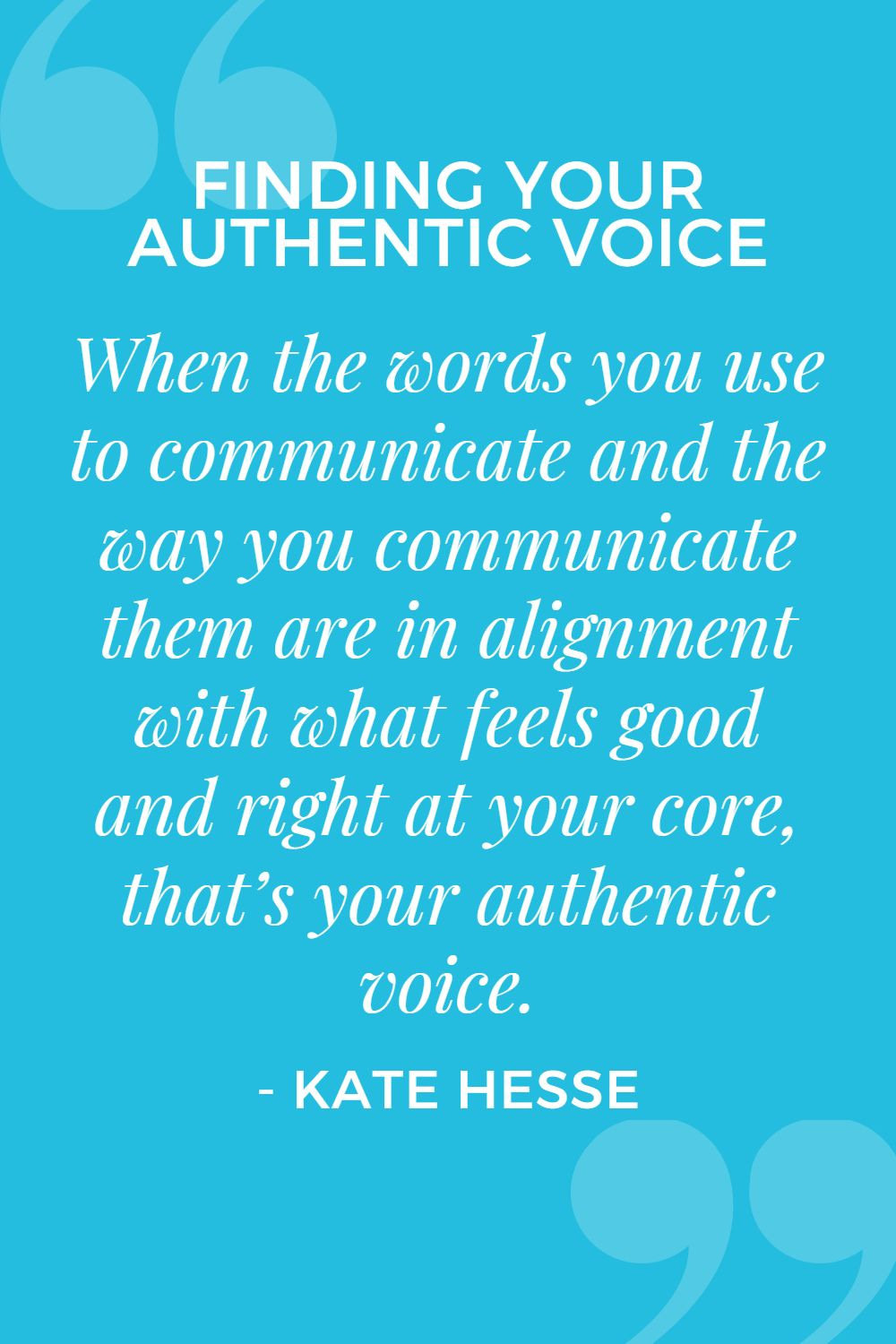 Before we dive into the how, let’s talk about what exactly your authentic voice is!
Before we dive into the how, let’s talk about what exactly your authentic voice is!
When the words you use to communicate, and the way you communicate them, are in alignment with what feels good and right at your core, that’s your authentic voice.
What it isn’t is saying things because you think they’re what others want you to say. Or saying things because they align with the person you think you should be. It’s also not repeating something you heard someone else say simply because they’re supposed to be the expert – without first taking the time to make sure it feels true to you.
It can be so easy to lose your authentic voice. It may start with feeling as though you can’t or shouldn’t say what you want to say.
You might begin replacing what you want to say with what you think you should say. What the “right” thing is to say.
And it doesn’t take long before you forget what your authentic voice sounds like because you’ve been so busy trying to sound like what you think you “should” sound like.
Kids often say the darnedest things because they haven’t taken on layers of “shoulds” yet and are speaking with their authentic voice.
Identify the “should’s” that are muffling your authentic voice
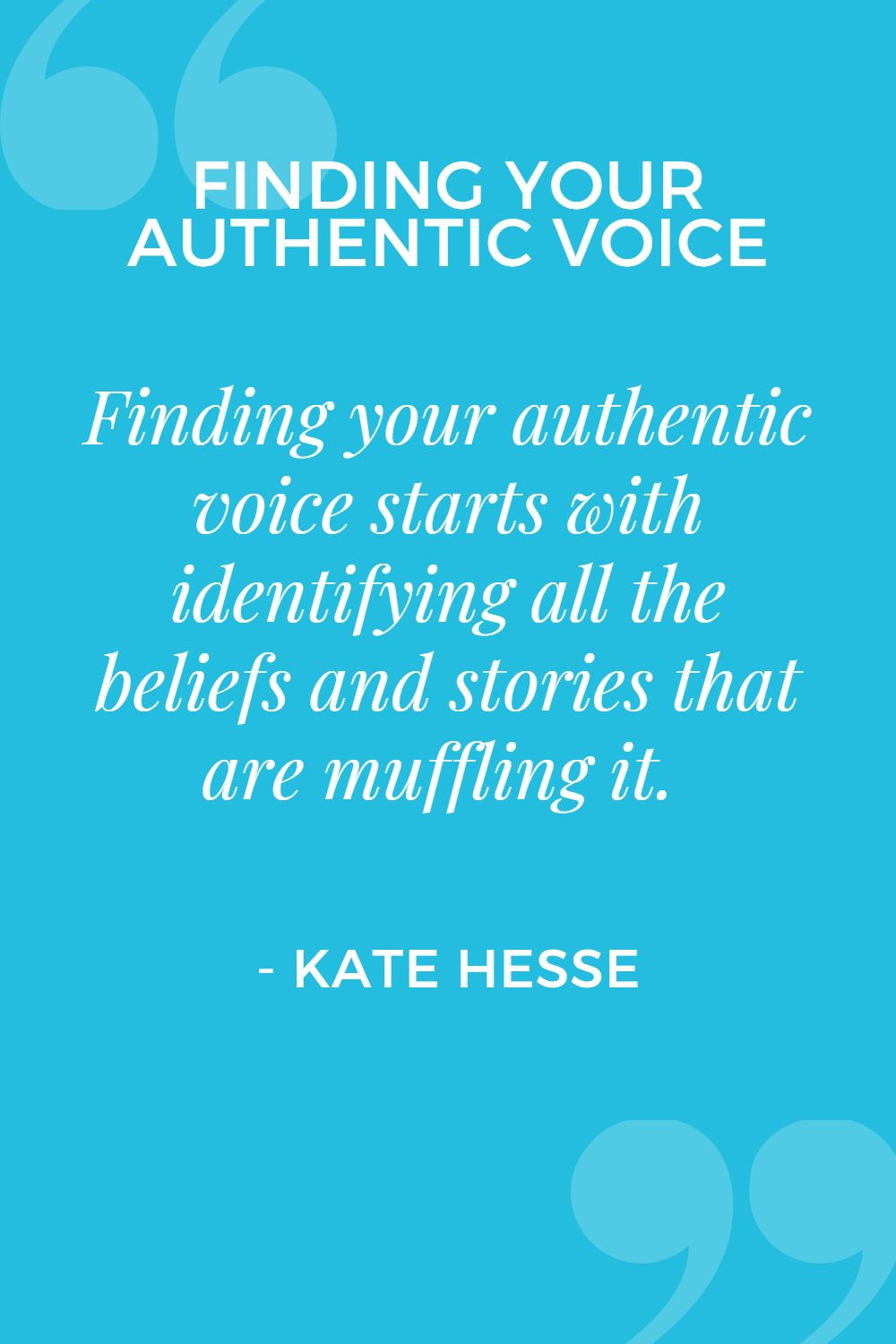 If you’ve said the word “should” in my presence in the past five or so years, you probably have an idea of the first step here.
If you’ve said the word “should” in my presence in the past five or so years, you probably have an idea of the first step here.
Finding your authentic voice starts with identifying all the beliefs and stories that are muffling it. When you catch yourself saying the word “should” it’s usually a great sign you’re trying to meet someone else’s standard – but not your own.
Have you ever found yourself saying – “it’s ok” or “it’s not a big deal” when in reality it really isn’t ok and it is a big deal? Maybe you find yourself fuming in frustration because you’re stuck at work alone finishing up a big project – after telling everyone you’d be ok if they went home to their families.
Take a moment and think of the last time you found your thoughts and words were out of alignment in this way. Now think about the story or belief that caused you to respond in that way. Maybe it’s something along the lines of “nice women don’t make other people’s lives harder”, or “good girls respect their elders by staying silent”, or “people only like me because of what I can do for them”.
This can be big work digging in and discovering the stories and beliefs fueling your “shoulds”. To help give you a framework in which to get started, I’ve put together a worksheet and companion blog post – you can download the worksheet using the form below. We also did a micro exercise on this topic in Episode 6 of the podcast – and it’s a great place to start if diving in head first feels a little overwhelming.
The guilt these beliefs bring
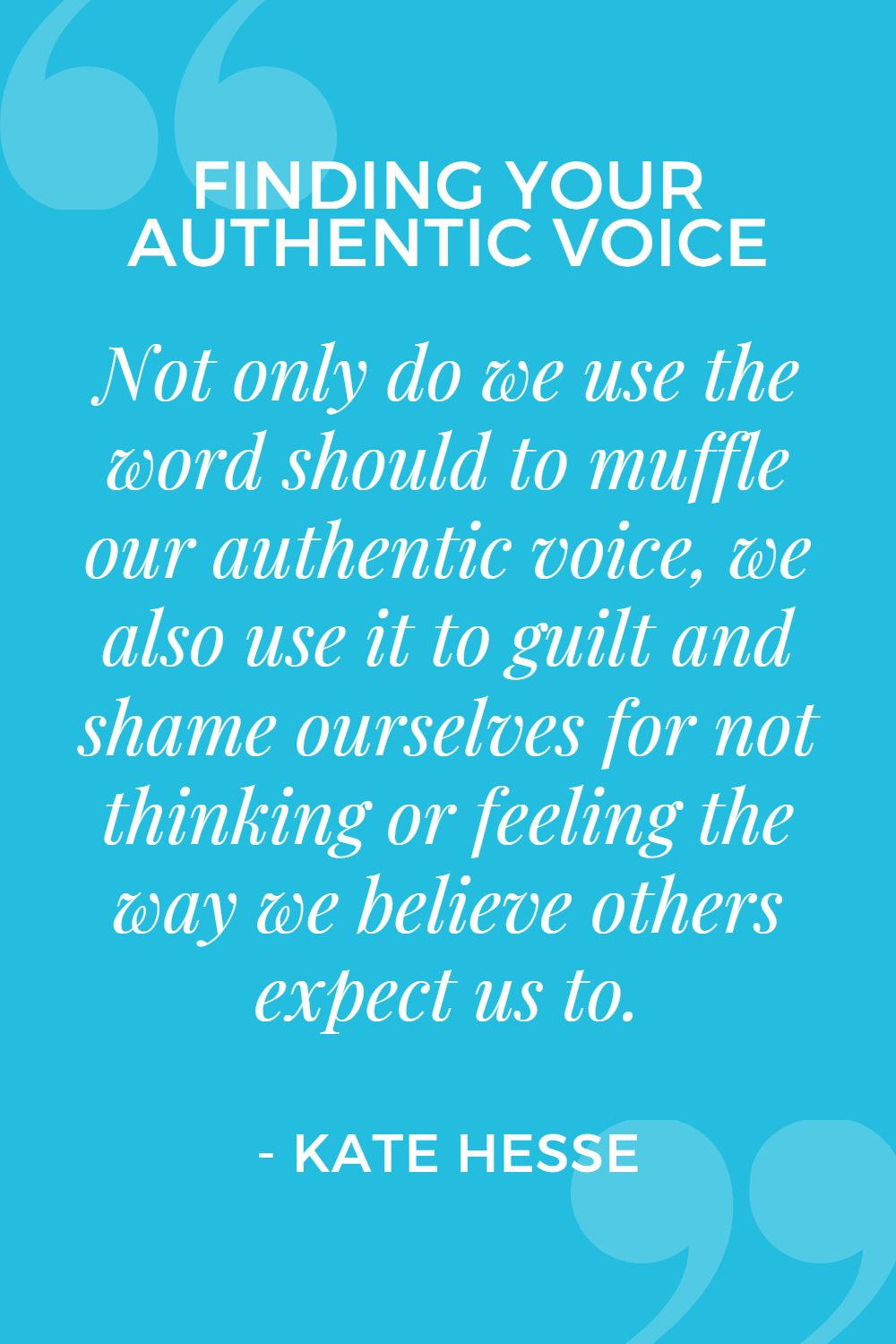 Not only do we use the word should to muffle our authentic voice, we also use it to guilt and shame ourselves for not thinking or feeling the way we believe others expect us to.
Not only do we use the word should to muffle our authentic voice, we also use it to guilt and shame ourselves for not thinking or feeling the way we believe others expect us to.
I was on a Discovery Call with someone the other day who noted she sometimes spends more time running errands than she “should”. I stopped her to drill down on that. For her, running errands is one of the few times she gets a break from taking care of her kids. It’s her alone time. And some days she’s going to need a little more of that than others in order to return to her family as her best self.
The amount of time it “should” take her to complete her errands was her belief of what others thought was an appropriate span of time in which to do those tasks. In identifying that belief, she was able to shift her language to instead say – sometimes I need a little extra alone time so I drive a few miles below the speed limit, take extra time to pick out my produce, or wander the aisles of the big box store instead of having the item I need ready for curbside pickup.
The way she framed her errand running changed – that shift in mindset and languaging is key to finding your authentic voice!
The way we say our words
But it’s not just about the words we say, it’s also about how we say them.
Maybe you phrase a statement you firmly believe in as a question because you’re not sure how the other person you’re talking to thinks or feels on the subject. Or perhaps you use a carefree tone even though you’re talking about something you feel very strongly about. It could be something as little as what to have for dinner or something as big as making a major life choice.
Remember those first attempts I made at guided meditations and visualizations? When I recorded them I thought I “should” sound ethereal and enlightened. I’d been listening to guided meditations from a few people at the time who were really breathy – and I thought that was what a good meditation recording “should” sound like.
So I attempted to recreate that cadence, tone, and airy quality. But whether you’ve been listening since the podcast launched or this is the first episode you’ve caught, I’m guessing you know that breathy and ethereal are not words most people would use to describe my speaking voice.
As a result, you could hear the inauthenticity in my voice as I attempted to replicate the sound of someone I wasn’t.
What happens when you find a should
In order to get to the point where I was recording in a way people who knew me would actually recognize my voice, I had to address a lot of stories and beliefs I had around being good enough. I had to excavate everything holding me in a place of feeling I didn’t have something to offer unless I sounded like someone else.
I’m still finding and releasing some of these stories but I’ve come a long way.
I’ll be honest – if you were having a conversation with me in person I’d sound a little different then I do on the podcast – I can be a lazy speaker and I don’t always enunciate – if we’re having an actual conversation you can always ask me to repeat myself, but I don’t want you to have to rewind ten seconds a dozen times to figure out what I’m saying on the podcast.
But – if you’ve been listening to the podcast and you heard my voice in the grocery store – you’d know it was me.
Get really clear on what’s truly important to you
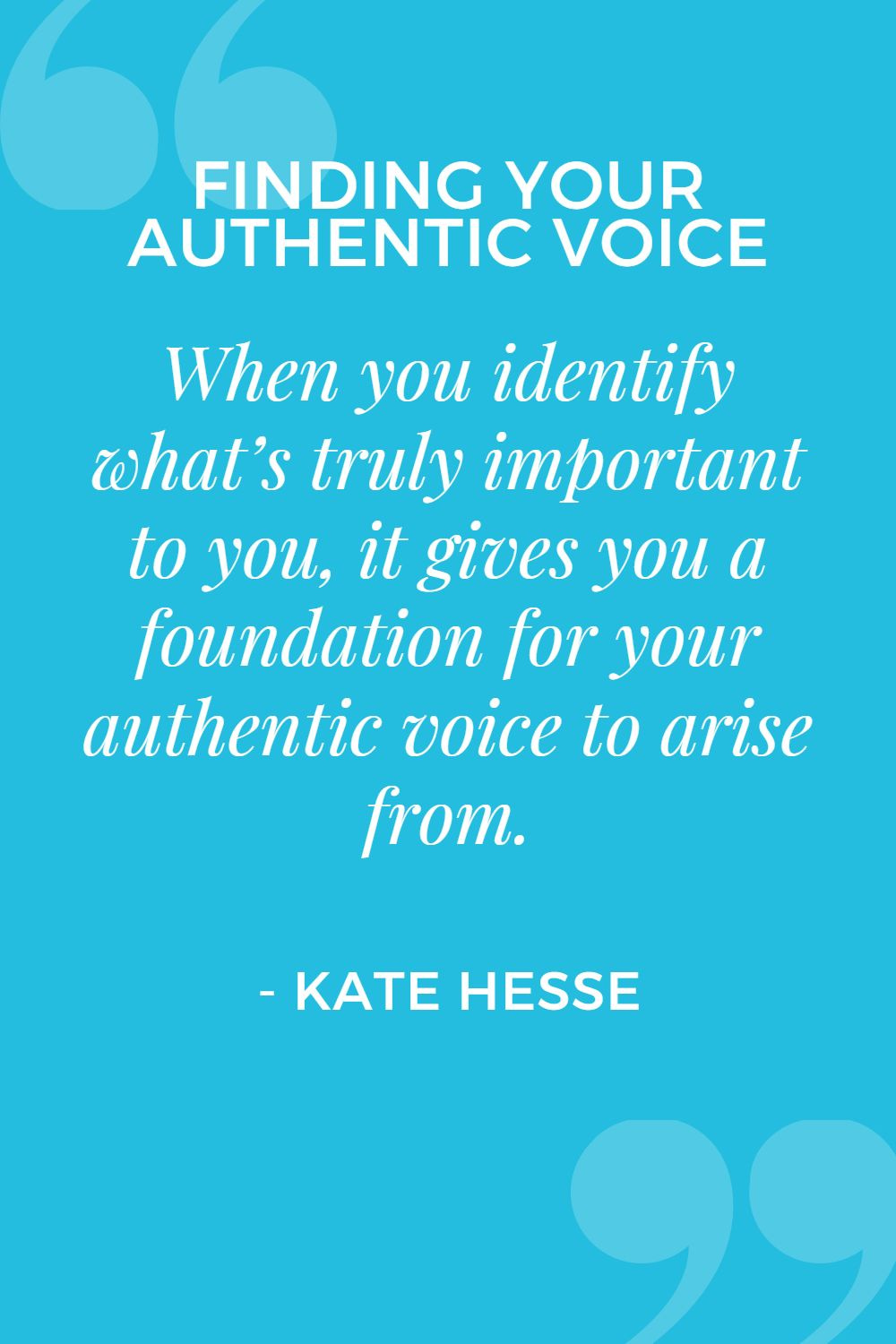 So far we’ve been talking all about the shoulds and stories that have muffled your authentic voice.
So far we’ve been talking all about the shoulds and stories that have muffled your authentic voice.
But recognizing what isn’t your authentic voice is only half of the puzzle. When you peel back the layers of stories, you need to make sense of what you find there in order to truly find your authentic voice.
Don’t worry – I’ve got another worksheet and blog post to help you with this part of the process too! You can download all the worksheets for this post using the form below.
Understanding your unique priorities and values is an important piece of finding your authentic voice. If you identify one of your priorities as spending quality time with your family every day, when someone asks you to take on an extra project at work that would require longer hours and missing dinner at home most nights, you can easily see that saying no to that project would be using your authentic voice, while saying yes wouldn’t.
When you identify what’s truly important to you, it gives you a foundation for your authentic voice to arise from. And it helps you filter out what you don’t actually believe. Sometimes it’s only when we identify what we do believe that we’re able to release additional stories as we discover they aren’t actually in alignment with how we authentically think and feel.
Recognizing your unique priorities and values
You’ve probably been covering yourself in shoulds for years – maybe even decades. Give yourself some grace to recognize that you probably don’t have all of your unique priorities and values at the tip of your tongue!
That’s why I’ve put together a worksheet with a number of questions to help you begin to identify what’s truly important to you. Again, you can get all the worksheets for this post using the form below.
Here are a few key things to think about as you work through this process with or without the worksheet.
Get super specific
If you just wrote I am loving. That could mean a lot of things. It could mean having 13 kids. Or it could mean volunteering at your local animal shelter a few times a week. Or so many other ways you could express a loving nature.
So get specific. Maybe you identify that you share your love with your family by cooking dinner for them every night and having a sit down meal together without screens.
Instead of “I enjoy learning”, you might identify making time to take a community college class each semester just for fun as one of your unique priorities.
Just make sure that each part of the statement makes you feel like “YES” that’s something I really want to do and a statement I can stand behind!
And allow room for change
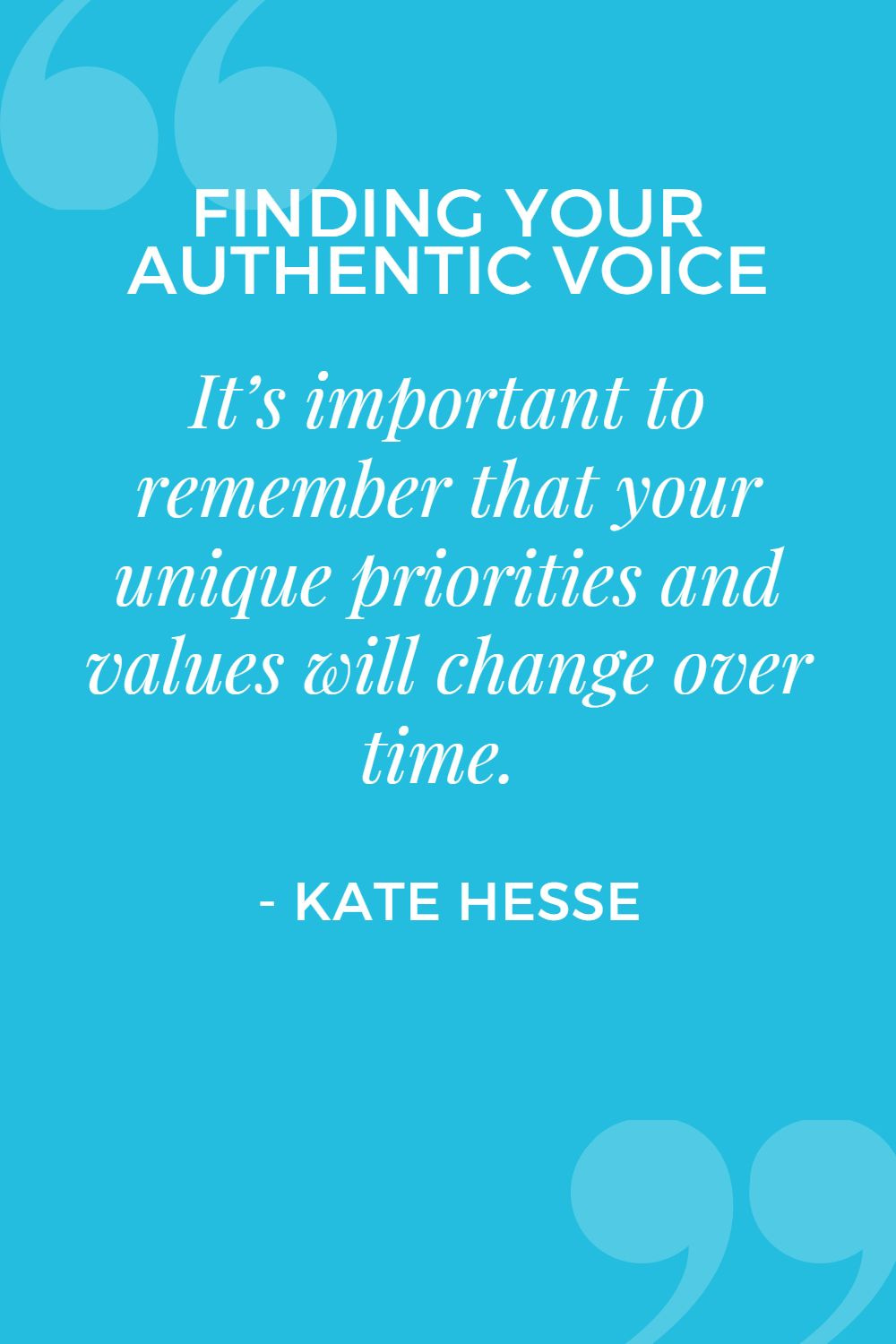 It’s also important to remember that your unique priorities and values will change over time. If you’re a parent, your priorities when your kids are little are likely going to be very different then they are when your kids go to college. Similarly, your priorities when you’re single may be different then when you’re in a long-term relationship.
It’s also important to remember that your unique priorities and values will change over time. If you’re a parent, your priorities when your kids are little are likely going to be very different then they are when your kids go to college. Similarly, your priorities when you’re single may be different then when you’re in a long-term relationship.
They are also likely to change as you learn and grow. Allow yourself the grace to adjust your unique priorities and values as you move through all the seasons of life. While the core sentiment probably won’t change, the specific sentences likely will.
For example – while the statement about cooking dinner every night for your family might make sense when your kids are living at home, when they go off to college, you might find yourself sharing your love in a different way.
Finding Your Authentic Voice
We’re at the final stage in finding your authentic voice – you’ve identified your unique priorities and values, and you’ve identified all the stories you’ve been muffling that voice with.
Now it’s time to release those stories and to begin speaking with your authentic voice from a place of alignment with your unique priorities and values.
But I know it isn’t as simple as that sentence makes it seem!
Simply finding your authentic voice doesn’t necessarily guarantee you feel safe or comfortable using it. And while identifying out-dated stories is a great first step in releasing them, simply naming them doesn’t actually release all the reasons you believed them in the first place.
So I’ve put together another full podcast episode covering tools, techniques, and mindset shifts to help you begin to comfortable speak with your authentic voice. Make sure you’re subscribed wherever you receive podcasts so you don’t miss it when it’s released next Tuesday!
If you’ve got a question that you’d love to hear addressed on a future episode, please submit it using this form. And remember – living your best life isn’t about changing your life – it’s about changing the way you show up for your life!
Show Notes
Additional Resources
Don’t forget to grab your copy of the worksheets I discussed in this episode using the form below!
Mentioned in this Episode
Learn more about identifying the stories behind your “should”
Explore the micro exercise on discovering your stories and beliefs
Get clear on your unique priorities & values
Schedule a Personal Roadmap Discovery Session.
Get on the VIP list to have all podcast worksheets delivered to your inbox each Tuesday morning.
Submit your question to be featured on a future episode.
Related
One thought on “Let others know what you truly want and need when you find your authentic voice!”
Leave a Reply Cancel reply
This site uses Akismet to reduce spam. Learn how your comment data is processed.
[…] back to the second half of our two part discussion on your authentic voice. If you missed the first half, you might want to pause and go back to that one before coming back here. The first half of the […]